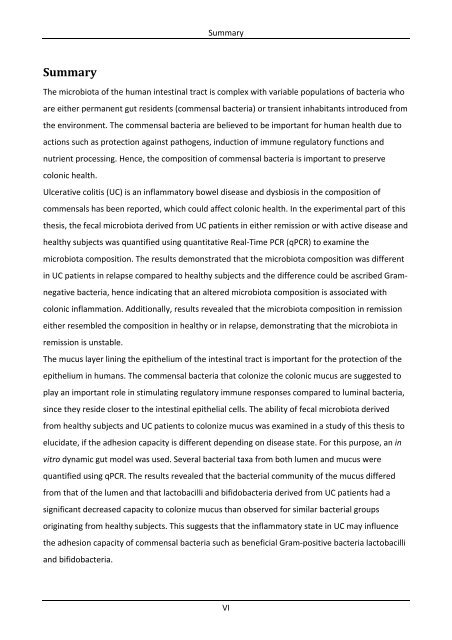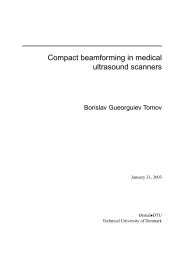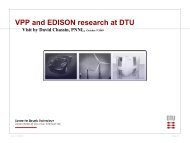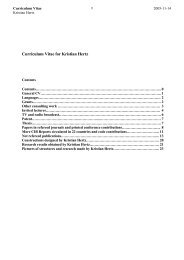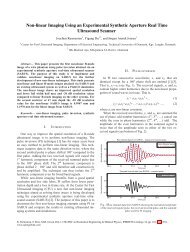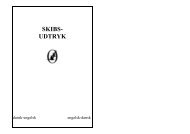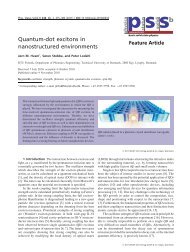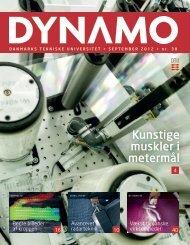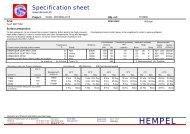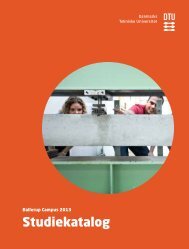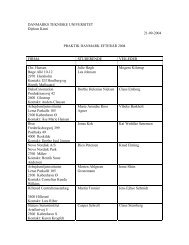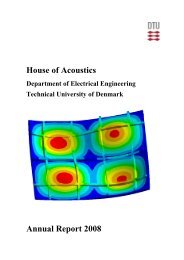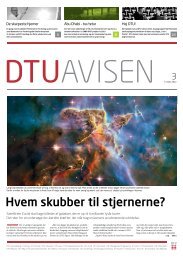Role of Intestinal Microbiota in Ulcerative Colitis
Role of Intestinal Microbiota in Ulcerative Colitis
Role of Intestinal Microbiota in Ulcerative Colitis
You also want an ePaper? Increase the reach of your titles
YUMPU automatically turns print PDFs into web optimized ePapers that Google loves.
Summary<br />
Summary<br />
The microbiota <strong>of</strong> the human <strong>in</strong>test<strong>in</strong>al tract is complex with variable populations <strong>of</strong> bacteria who<br />
are either permanent gut residents (commensal bacteria) or transient <strong>in</strong>habitants <strong>in</strong>troduced from<br />
the environment. The commensal bacteria are believed to be important for human health due to<br />
actions such as protection aga<strong>in</strong>st pathogens, <strong>in</strong>duction <strong>of</strong> immune regulatory functions and<br />
nutrient process<strong>in</strong>g. Hence, the composition <strong>of</strong> commensal bacteria is important to preserve<br />
colonic health.<br />
<strong>Ulcerative</strong> colitis (UC) is an <strong>in</strong>flammatory bowel disease and dysbiosis <strong>in</strong> the composition <strong>of</strong><br />
commensals has been reported, which could affect colonic health. In the experimental part <strong>of</strong> this<br />
thesis, the fecal microbiota derived from UC patients <strong>in</strong> either remission or with active disease and<br />
healthy subjects was quantified us<strong>in</strong>g quantitative Real‐Time PCR (qPCR) to exam<strong>in</strong>e the<br />
microbiota composition. The results demonstrated that the microbiota composition was different<br />
<strong>in</strong> UC patients <strong>in</strong> relapse compared to healthy subjects and the difference could be ascribed Gram‐<br />
negative bacteria, hence <strong>in</strong>dicat<strong>in</strong>g that an altered microbiota composition is associated with<br />
colonic <strong>in</strong>flammation. Additionally, results revealed that the microbiota composition <strong>in</strong> remission<br />
either resembled the composition <strong>in</strong> healthy or <strong>in</strong> relapse, demonstrat<strong>in</strong>g that the microbiota <strong>in</strong><br />
remission is unstable.<br />
The mucus layer l<strong>in</strong><strong>in</strong>g the epithelium <strong>of</strong> the <strong>in</strong>test<strong>in</strong>al tract is important for the protection <strong>of</strong> the<br />
epithelium <strong>in</strong> humans. The commensal bacteria that colonize the colonic mucus are suggested to<br />
play an important role <strong>in</strong> stimulat<strong>in</strong>g regulatory immune responses compared to lum<strong>in</strong>al bacteria,<br />
s<strong>in</strong>ce they reside closer to the <strong>in</strong>test<strong>in</strong>al epithelial cells. The ability <strong>of</strong> fecal microbiota derived<br />
from healthy subjects and UC patients to colonize mucus was exam<strong>in</strong>ed <strong>in</strong> a study <strong>of</strong> this thesis to<br />
elucidate, if the adhesion capacity is different depend<strong>in</strong>g on disease state. For this purpose, an <strong>in</strong><br />
vitro dynamic gut model was used. Several bacterial taxa from both lumen and mucus were<br />
quantified us<strong>in</strong>g qPCR. The results revealed that the bacterial community <strong>of</strong> the mucus differed<br />
from that <strong>of</strong> the lumen and that lactobacilli and bifidobacteria derived from UC patients had a<br />
significant decreased capacity to colonize mucus than observed for similar bacterial groups<br />
orig<strong>in</strong>at<strong>in</strong>g from healthy subjects. This suggests that the <strong>in</strong>flammatory state <strong>in</strong> UC may <strong>in</strong>fluence<br />
the adhesion capacity <strong>of</strong> commensal bacteria such as beneficial Gram‐positive bacteria lactobacilli<br />
and bifidobacteria.<br />
VI


